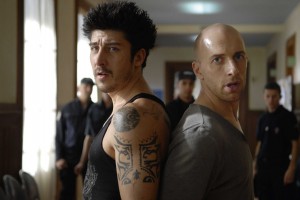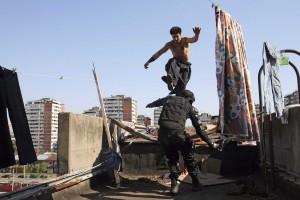District 13: Ultimatum
 On Conan O’Brien’s final show before he was forced off The Tonight Show, he said that people should try to avoid being cynical about life, as that was his least favorite emotion. It’s a noble gesture and it’s a nice thought that one can go through life believing people and not looking for ulterior motives. American movies have been taking that to heart recently, punishing the pragmatist at the expense of all logic, in the hopes that everything will work itself out. Two films in the last six months (both directed by foreigners with big studio money behind them, and ridiculously bloated running times) 2012 and Orphan, have gone out of their way to cleanse themselves of gray areas by praising the optimist and denigrating those who might react to a situation rationally.
On Conan O’Brien’s final show before he was forced off The Tonight Show, he said that people should try to avoid being cynical about life, as that was his least favorite emotion. It’s a noble gesture and it’s a nice thought that one can go through life believing people and not looking for ulterior motives. American movies have been taking that to heart recently, punishing the pragmatist at the expense of all logic, in the hopes that everything will work itself out. Two films in the last six months (both directed by foreigners with big studio money behind them, and ridiculously bloated running times) 2012 and Orphan, have gone out of their way to cleanse themselves of gray areas by praising the optimist and denigrating those who might react to a situation rationally.
2012 has Oliver Platt’s high ranking government official character be the villain as he tries to save what’s left of the world by making tough choices on who is deserving of waiting out the ongoing environmental apocalypse. But for some reason, John Cusack’s character, who endangers the lives of those few remaining alive, and unnecessarily at that, is painted as the humanistic hero, even though he exponentially increases the chance that everyone will die, especially because of a lack of supplies. 2012, even by the loose standards of a Roland Emmerich film (Independence Day, The Day After Tomorrow), has an absolutely absurd conclusion, because it assumes that the audience believes in utopia, and that they won’t think about the next five minutes after the fade out, when it is likely everyone will drown.
 Orphan does the same thing as 2012 but on a much smaller scale. A well-off, loving family (Peter Saarsgard, Vera Farmiga, and two truly irritating moppets) adopt a mysterious Russian girl, Esther, who’s strident and rigid personal standards and dress code make her the butt of her schoolmate’s mocking and abuse. Esther is smart, patient, but sensitive, and her response to the other children’s intolerance, screaming for them to go away, is not really all that out of whack with how a child in that situation would react. But producer Joel Silver (Lethal Weapon, Die Hard, The Book of Eli) ever the audience underestimater, whose personal stamp is all over Orphan, stacks the deck, probably realizing how unsympathetic the whitebread family is, and how we might not have a problem with Esther taking them out, he turns Esther into a full-fledged cartoonish monster. Honestly, the world would probably be better off with fewer spoiled and selfish families like this, but Silver takes the decision out of our hands by having Esther, in front of her deaf-mute sister, kill a nun.
Orphan does the same thing as 2012 but on a much smaller scale. A well-off, loving family (Peter Saarsgard, Vera Farmiga, and two truly irritating moppets) adopt a mysterious Russian girl, Esther, who’s strident and rigid personal standards and dress code make her the butt of her schoolmate’s mocking and abuse. Esther is smart, patient, but sensitive, and her response to the other children’s intolerance, screaming for them to go away, is not really all that out of whack with how a child in that situation would react. But producer Joel Silver (Lethal Weapon, Die Hard, The Book of Eli) ever the audience underestimater, whose personal stamp is all over Orphan, stacks the deck, probably realizing how unsympathetic the whitebread family is, and how we might not have a problem with Esther taking them out, he turns Esther into a full-fledged cartoonish monster. Honestly, the world would probably be better off with fewer spoiled and selfish families like this, but Silver takes the decision out of our hands by having Esther, in front of her deaf-mute sister, kill a nun.
 Writer-Producer Luc Besson doesn’t spend enough time cobbling his scripts together to think about moral ramifications, so in Patrick Alessandrin’s District 13: Ultimatum, he has the villain (who admits he’s a bad guy because he’s a pragmatist) and eventually the heroes agree that perhaps wiping the slate clean is better than trying to clean up a cesspool. Granted, the entire film (once again co-starring fight choreographers David Belle and Cyril Raffaelli) is about trying to save said slums, so the fact that the heroes spend their time trying to protect dilapidated drug-infested buildings is pretty funny. It’s also funny that Besson is so unsubtle about criticizing this viewpoint that he names the evil corporation intent on getting rid of the poor and building a middle-class yuppietopia, Harriburton (but with a disclaimer that their actions are going on all over the world, “except in France”), and then ends up completely endorsing the same behavior he supposedly loathes. Is it because Besson secretly believes that such a mindset is the only way to get things done, which is why his production company EuropaCorp puts out nearly ten movies a year (District 13: Ultimatum, a sequel to District 13, was released the same week as another Besson production, From Paris With Love) in such a strict formula, that it is very similar to running a factory?
Writer-Producer Luc Besson doesn’t spend enough time cobbling his scripts together to think about moral ramifications, so in Patrick Alessandrin’s District 13: Ultimatum, he has the villain (who admits he’s a bad guy because he’s a pragmatist) and eventually the heroes agree that perhaps wiping the slate clean is better than trying to clean up a cesspool. Granted, the entire film (once again co-starring fight choreographers David Belle and Cyril Raffaelli) is about trying to save said slums, so the fact that the heroes spend their time trying to protect dilapidated drug-infested buildings is pretty funny. It’s also funny that Besson is so unsubtle about criticizing this viewpoint that he names the evil corporation intent on getting rid of the poor and building a middle-class yuppietopia, Harriburton (but with a disclaimer that their actions are going on all over the world, “except in France”), and then ends up completely endorsing the same behavior he supposedly loathes. Is it because Besson secretly believes that such a mindset is the only way to get things done, which is why his production company EuropaCorp puts out nearly ten movies a year (District 13: Ultimatum, a sequel to District 13, was released the same week as another Besson production, From Paris With Love) in such a strict formula, that it is very similar to running a factory?
Doubtful, but somehow District 13: Ultimatum, by being a completely scattered mess, is much more entertaining than the original. The start-stop rhythm lets you know when you can focus less on the obvious plot mechanics and governmental conspiracy stuff, and recharge for the next ridiculous and acrobatic Parkour sequence. As an art form, Parkour most closely resembles the 110 Meter Hurdles, except with chiseled teenagers jumping balconies and roofs of buildings, somehow avoiding the constant threat of breaking one’s ankle upon landing.
 Such believability never enters District 13: Ultimatum, and that’s an attribute in this case, so when we see the kitchen workers in a Chinese club cutting open watermelons and pulling out baggies of drugs from inside, we don’t question how that would be possible (can you plant watermelon seeds that grow heroin inside of them?), or why they would go to such trouble as the watermelons come from their own delivery truck. Ok, maybe we do question a lot of those things. But the sequence the watermelon delivery is so lengthy, absurd and over-the-top that it doesn’t matter. The scene somehow mixes martial arts and slapstick out of a Jackie Chan film, with humorously laborious traps for criminals, and concludes with a moment where a cop, played by Raffaelli, who has already taken on seemingly fifty henchmen, puts a giant steel cover over a bomb and then sits on top of the cover as the bomb explodes (blowing him a few feet into the air), transforming what could be described as cartoon-like into an actual cartoon. The scene is reminiscent of the creativity and energy of the recent Tony Jaa’s film Tom Yum Goong (known as The Protector in the US), where Jaa, in one unbroken 4 minute shot, using his patented Muy Thai fighting style, beats up hundreds of foes as he climbs the stairs of an enormous and varied lair.
Such believability never enters District 13: Ultimatum, and that’s an attribute in this case, so when we see the kitchen workers in a Chinese club cutting open watermelons and pulling out baggies of drugs from inside, we don’t question how that would be possible (can you plant watermelon seeds that grow heroin inside of them?), or why they would go to such trouble as the watermelons come from their own delivery truck. Ok, maybe we do question a lot of those things. But the sequence the watermelon delivery is so lengthy, absurd and over-the-top that it doesn’t matter. The scene somehow mixes martial arts and slapstick out of a Jackie Chan film, with humorously laborious traps for criminals, and concludes with a moment where a cop, played by Raffaelli, who has already taken on seemingly fifty henchmen, puts a giant steel cover over a bomb and then sits on top of the cover as the bomb explodes (blowing him a few feet into the air), transforming what could be described as cartoon-like into an actual cartoon. The scene is reminiscent of the creativity and energy of the recent Tony Jaa’s film Tom Yum Goong (known as The Protector in the US), where Jaa, in one unbroken 4 minute shot, using his patented Muy Thai fighting style, beats up hundreds of foes as he climbs the stairs of an enormous and varied lair.
 Luc Besson was responsible for getting Jaa’s breakthrough film, Ong Bak: Thai Warrior, out into the world, and it might serve him well to sign up Jaa for a third installment of District 13 (imagine Parkour vs. Muy Thai). Not that Ultimatum maintains the mix of innocence and wide-eyed athleticism (and elephants) of most Tony Jaa films, there’s an awful lot of downtime here, especially the long sequences of “getting the team together” which flags the momentum of the wonderfully nonsensical stuff of a car going through an office building and the notion that you could headbutt a guy wearing a helmet and he’s the one who’d walk away hurt. Jaa’s films, while more than simplistic and incompetent from a story perspective, don’t do as much moralistic pretending that Besson feels the need to siphon into his films. Perhaps Jaa could get one of his trusty elephants to squash Besson, leaving Belle and Raffaelli free to co-star in Ong Bak 3.
Luc Besson was responsible for getting Jaa’s breakthrough film, Ong Bak: Thai Warrior, out into the world, and it might serve him well to sign up Jaa for a third installment of District 13 (imagine Parkour vs. Muy Thai). Not that Ultimatum maintains the mix of innocence and wide-eyed athleticism (and elephants) of most Tony Jaa films, there’s an awful lot of downtime here, especially the long sequences of “getting the team together” which flags the momentum of the wonderfully nonsensical stuff of a car going through an office building and the notion that you could headbutt a guy wearing a helmet and he’s the one who’d walk away hurt. Jaa’s films, while more than simplistic and incompetent from a story perspective, don’t do as much moralistic pretending that Besson feels the need to siphon into his films. Perhaps Jaa could get one of his trusty elephants to squash Besson, leaving Belle and Raffaelli free to co-star in Ong Bak 3.



